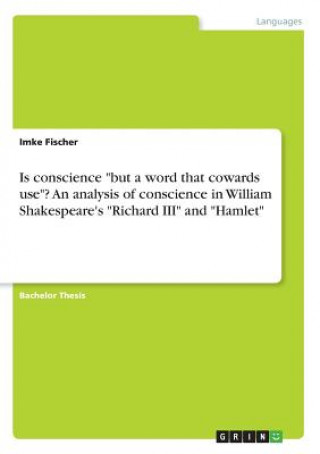
Doručení
Nákupní rádce





Nehodí se? Vůbec nevadí! U nás můžete do 30 dní vrátit
 Dárkový poukaz
V libovolné hodnotě
Dárkový poukaz
V libovolné hodnotě
S dárkovým poukazem nešlápnete vedle. Obdarovaný si za dárkový poukaz může vybrat cokoliv z naší nabídky.
Is Conscience But a Word That Cowards Use? an Analysis of Conscience in William Shakespeare's Richard III and Hamlet
 Angličtina
Angličtina
 125 b
125 b
30 dní na vrácení zboží
Mohlo by vás také zajímat


Bachelor Thesis from the year 2016 in the subject English - Literature, Works, grade: 1,1, University of Göttingen, language: English, abstract: In the famous title quote from Richard III, William Shakespeare has his protagonist disregard the concept of conscience as a mere ,word', an invention of no further consequence to a brave person. Meanwhile Hamlet complains that "conscience does make cowards of us all" and thereby infers a strong significance of conscience to mankind. These popular, though seemingly contradictory statements raise the question just what exact understanding of said moral concept Shakespeare wanted to relay to his audience. What was conscience to him, his audience and his contemporary writers? Was conscience seen as ,but a word', a cowardly excuse for inaction or as an innate concept dwelling in every man? What were the underlying principles of his set of moral values? Both the author and his contemporaries had an interest towards both the specific moral phenomenon of conscience as well as toward the intricacies of the human persona and its inner moral values. In the two plays at hand, Richard III and Hamlet, conscience is displayed as an innate concept. In their beliefs towards this concept, heroes and villains do not contradict, but complement each other. All relevant scenes from the two plays taken together exhibit a comprehensive image of the discourse of conscience in the Elizabethan age. It ranges from personified character and externality to an inner contemplation with God and man's own soul, from an exhilarating righteous feeling to purgatory-like torment on Earth. It shows a broad understanding of the term, much more extensive than our modern perception of it, which has narrowed down to the single meaning of discernment between good and evil. Nevertheless, conscience stands in a long tradition of philosophical debates and Shakespeare adds his own touch to it with Richard III. and Hamlet, leaving modern eyes with a better appreciation of concept of conscience.
Informace o knize
 Angličtina
Angličtina




 Jak nakupovat
Jak nakupovat





















